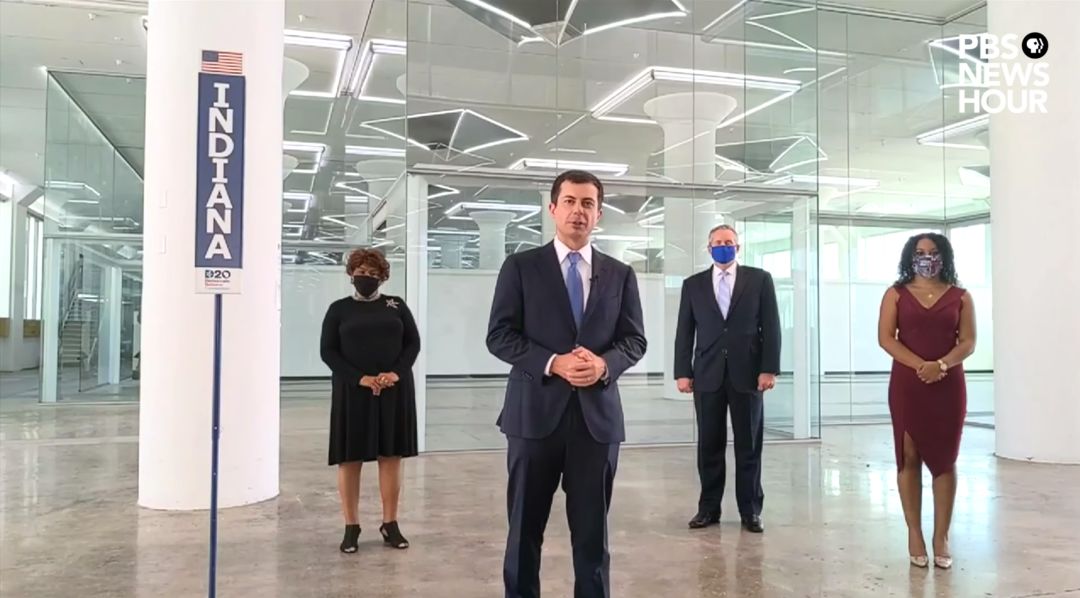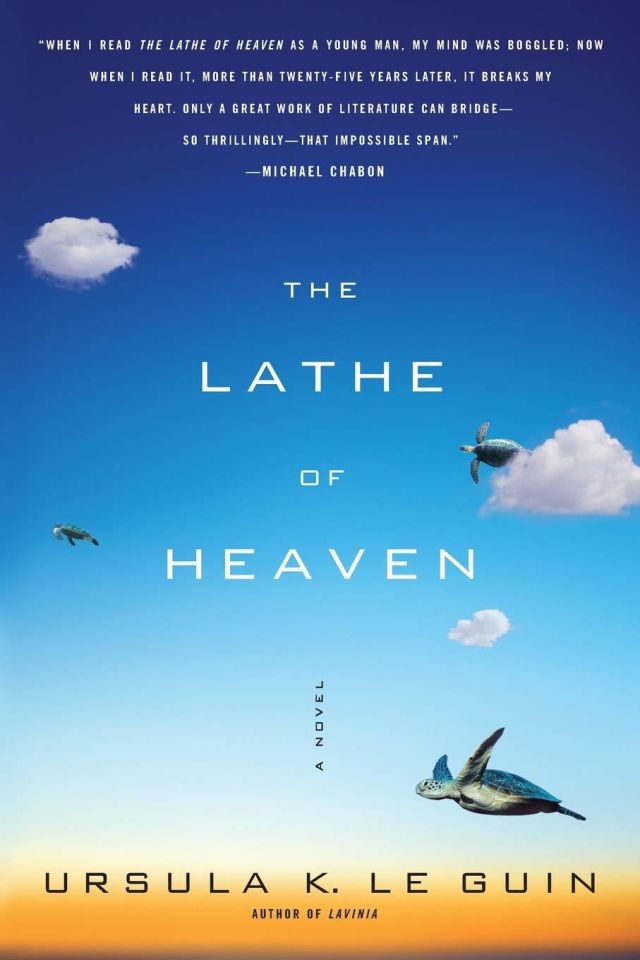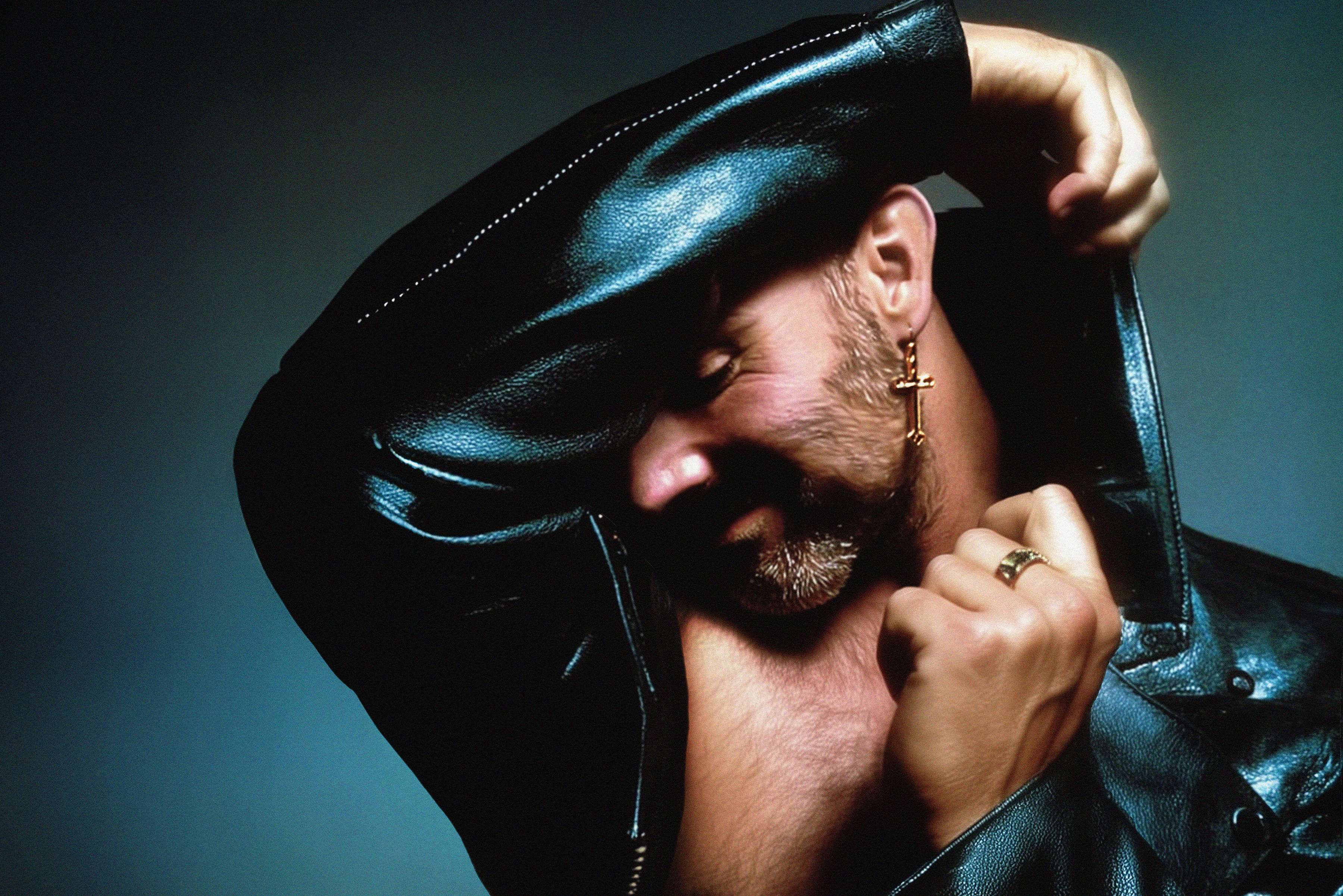What to Read, Watch, and Listen to This Week: Aug 19

Pete Buttigieg delivers Indiana’s votes for the Democratic nominee from the set of The Matrix (we’re pretty sure, at least) during the DNC's Tuesday-night virtual roll call.
Image: PBS/YouTube
There’s a lot going on right now. Maybe you’re protesting, maybe you’re donating, maybe you’re keeping tabs on the way your representatives are responding to the present moment. Keep doing that!
Our lives are not one thing, though, and you’re also probably looking to escape, however briefly, into a show or a book or an album that might help you shut out the world or understand it a little better. To get the wheels turning, here’s the stuff filling our queues at Portland Monthly this week, from the DNC roll call to Zadie Smith.
DNC Roll Call
“A virtual trip around America” is the name chipper Wisconsinite and Democratic National Committee Secretary Jason Rae gave to the alphabetical roll call of states and territories presenting their delegate totals for Sen. Bernie Sanders and former Vice President Joe Biden, the raison d’être of the Democratic National Convention. You didn’t watch this charming, folksy parade of Indigenous accessories, get-out-the-vote face masks, gorgeous shimmering seas and mid-America vistas, and “what do I do with my hands?” moments that’s just crying out for the Miss Universe treatment from Tom & Lorenzo? We understand—the Blazers game was on at the same time! But you can still give yourself a 33-minute dose of heartstring-pulling sweet Americana, which starts with Rep. Terri Sewell presenting Alabama’s votes from a blue-lit Edmund Pettus Bridge and ends with two Keebler elves on a train platform in Delaware.
Here’s just some of what you’ll see in between: American Samoa’s Aliitama Sotoa, who announced the territory’s tally, could also have been on a ballpark PA announcing Biden was the next to bat. An Arkansas chef could be pitching Portlanders on a visit to Little Rock to check out its food cart scene, while a Maine B&B owner also seems to be making a travel pitch with his and his husband’s “25-acre organic farm on a lake.”
At first, you’re pretty sure California hired your Chico’s-cardigan-loving moms—who can’t quite figure out cell phones and tend to shout into the mike, always worried if you can hear them—to yell out its tallies on a windy beach, but then you realize it’s Rep. Barbara Lee and former Secretary of Labor Hilda Solis. In a very different setting, next to the Charles Bridge in Prague (you know, the one from INXS’s “Never Tear Us Apart” video), Democrats Abroad chair Julia Bryan is totally that girl you had a crush in college who never came home from her junior year overseas. Pete Buttigieg broadcasts from the set of The Matrix, while a Kansas farmer looks like a giant standing in the middle of an Andrew Wyeth painting. The kid standing behind Louisiana Rep. Cedric Richmond and New Orleans Mayor LaToya Cantrell is the best kid of the night.
The guys from Michigan are definitely trying to sell us those shiny cars behind them, the college president from Mississippi is definitely narrating a museum tour (or should—such a voice!), the young woman standing next to a New York nurse is definitely staring deep into your soul, and the Tennessee speaker is definitely being considered for Blair in a Facts of Life remake.
You’ll also learn there’s a Hidden Valley neighborhood (not ranch) and an awesome woman who’s been doing this for a long time and is not going to mince words (Cozzie Watkins) in Charlotte, North Carolina, some dudes in Ohio who like to party, a spot on your vacation bucket list for the US Virgin Islands’ “turquoise waters, white sand beaches, and friendly people,” and an official state appetizer in Rhode Island. Calamari!
You’ll also be reminded of tragedy. The father of a Parkland school shooting victim speaks from Florida and is one of several parents in the roll call who have lost children (as has Biden himself); Matthew Shepard’s parents deliver Wyoming’s votes, and Khizr Khan, who also spoke at the 2016 DNC, represents Virginia. A Colorado activist says three members of his family have tested positive for COVID. Oregon’s delegation—US Sens. Ron Wyden and Jeff Merkley stand silently with state Sen. Shemia Fagan while they let local party leaders Rosa Colquitt and Travis Nelson do the talking—appear in front of the bright mural at the Hollywood MAX station, honoring the victims of the 2017 multiple murder by a white supremacist. —Margaret Seiler, managing editor
Fast Times at Ridgemont High Table Read
Intimations

Zadie Smith has the rare gift of convincing you you are just as smart as she is. Whenever you enter one of her essays (I love her fiction but have always been partial to Zadie Smith the Cultural Critic), it feels like breathlessly keeping pace with your most brilliant friend: your friend might be driving but you’re both contributing, and you’re right there with them, arriving at the same conclusions they arrive at in real time. Then you close your book and enter reality and remember you are an intellectual shrimp who just got a glimpse into one of the greatest minds of our time, and you scramble to digest everything you’ve just learned before it’s gone.
Late last month, Smith released a slim, 97-page volume called Intimations, comprising six essays she’s written during the COVID-19 pandemic. One, a razor-sharp analysis of America’s relationship with death, previously appeared in the New Yorker, and all Smith’s royalties are going to the Equal Justice Initiative and the COVID-19 Emergency Relief Fund for New York.
It doesn’t exactly relieve the nail-biting about who’s gonna write the first Big Isolation Book—these essays wander, as all of Smith’s essays do, exploring issues thoroughly without reaching many hard conclusions, and it’s so bite-sized you can read the whole thing in an afternoon. That said, Intimations feels like a tall, sweaty glass of water after months in the desert: her incisive takes on race, our natural inclinations to resist nature, and the discomforts of domestic life during COVID provide sense and scaffolding to hang our half-year of utter chaos.
Her prose is sensitive, her brain as thrilling as ever, and her trademark mix of levelheadedness, latent self-loathing, and leveling compassion all coalesce as effectively here as they do in any of her novels or full-length collections. Every page is filled with brain-tumbling turns, and reading it reminds you, if only for a few hours, that you are part of a weird, fucked-up, beautiful whole. —Conner Reed, arts & culture editor
The Lathe of Heaven

When you move to Oregon, as I did in late January, there are a few literary names you ought to know: Chuck Palahniuk, Mitchell S. Jackson, Beverly Cleary, Ken Kesey, and, of course, Ursula K. Le Guin. Even prior to my move, Le Guin’s work in speculative fiction—although she is quite obviously more than simply a science fiction author—has floated above conversations with friends who shared my interest in sci-fi. “Have you ever read Ursula K. Le Guin?” “Oh, you should really read Ursula K. Le Guin.” “This reminds me of this book by Ursula K. Le Guin.”
So while browsing the local authors bookshelf in the desolate Portland Monthly offices, I came across Le Guin’s 1971 book The Lathe of Heaven, and I knew it was time. Not to mention, the cover features sea turtles swimming among clouds. Turtles have been appearing in my life recently, and I want to honor their sudden appearance.




